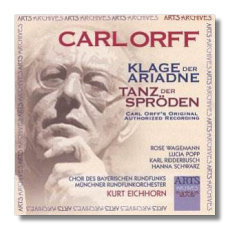
The Internet's Premier Classical Music Source
Related Links
- Orff Reviews
- Latest Reviews
- More Reviews
-
By Composer
-
Collections
DVD & Blu-ray
Books
Concert Reviews
Articles/Interviews
Software
Audio
Search Amazon
Recommended Links
Site News
 CD Review
CD Review
Carl Orff

- Klage der Ariadne
- Tanz der Spröden
Rose Wagemann (Ariadne, Venus), mezzo-soprano
Lucia Popp (Amor) – soprano
Hanna Schwarz (Eine Spröde), mezzo-soprano
Karl Ridderbusch (Pluto), bass
Bavarian Radio Choir
Munich Radio Orchestra/Kurt Eichorn
Arts Archives 43004-2 42m ADD
When 'Carmina Burana' was premièred in Frankfurt in 1937, Orff's popularity rocketed not only in Germany but throughout Europe as well. At the age of 40, he was not a young composer any more, but after 'Carmina's success, he insisted that this piece should be regarded as his Op. 1. Although he had already composed a great deal he wanted to withhold or even destroy all the works written prior to Carmina.
Only one group of works was spared the composer's censorship, the setting of three works by the Italian baroque genius, Claudio Monteverdi; 'Orfeo', 'Lamento dell'Arianna' and 'Ballo dell'Ingrate' presented under the collective title of 'Lamenti'. These pieces represent Orff's unstinting efforts over a 20 year period to find new dramatic and musical means of bringing back to the public's attention the opulent 'stile espressivo' of this early master.
The two works on this superbly remastered 1974 recording, 'Arianna' and 'Ballo' are wonderful examples of Orff's consummate ability to re-orchestrate for the modern ear and yet preserve the grandiosity of the originals with all their noble pathos and inventive vocal line. The German texts by Orff (Klage) and Dorothee' Gunther (Tanz) are convincingly sung with all soloists empathizing sensitively with the characters. Rose Wagemann's 'Arianna' is particularly impressive; her outpouring of grief is nothing less than a tear jerker. Orff's close associate, Kurt Eichorn conducts gracefully and sympathetically, giving full reign to singers and orchestra to highlight all the beauties of these unique creations. At 42 minutes, this disc is very much on the lean side, but its exemplary sound quality and huge artistic value more than compensate for this slight glitch.
Copyright © 2005, Gerald Fenech




















